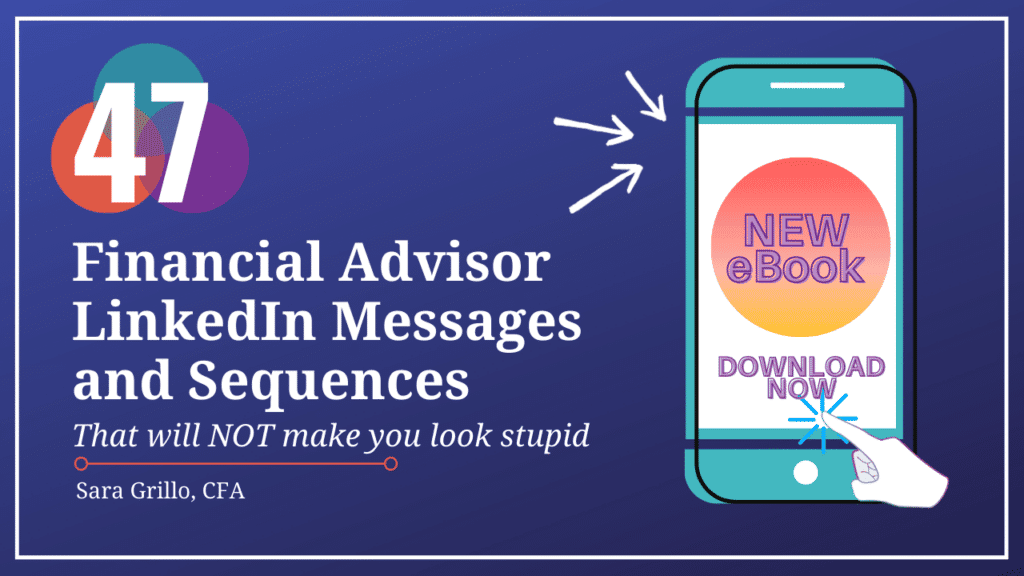Podcast: Play in new window | Download
The new SEC Marketing Rule 2021 is a gamechanger that will bring new dimensions to several important parts of financial advisor compliance such as testimonials, cash solicitation, and more. In this pod/blog, I interview legal and compliance advisors Richard Chen, and John Ivan and Andrew Lippman of Capital Forensics about the following topics:
- At a high level, what is the new SEC marketing rule?
- When is it effective?
- An overview of the 5 important areas to be aware of within the new rule
- Testimonials
- The Cash Solicitation Rule
- Moving to a principles-based approach and away from the rules-based approach
- Performance Advertising
- Entanglement & Adoption
- What are the opportunities and risks?
For those of you who are new to my blog/podcast, my name is Sara. I am a CFA® charterholder and financial advisor marketing consultant. I have a weekly newsletter in which I talk about financial advisor lead generation topics which is best described as “fun and irreverent.” So please subscribe!
Let’s get on with the blog!
The New SEC Marketing Rule 2021 is HUGE – don’t attempt it alone!
The new SEC Marketing Rule 2021 gives advisors the flexibility to be able to do many of the things they have always wanted to. The new law takes an entire set of rules that were written with a chisel and a hammer, and that everybody has been living by for so long, and changes them. It gives advisors a lot more freedom with their marketing, but there is a great deal of risk that comes along with it, too. Some of the changes are really easy and others are very esoteric.
And that is exactly why it is highly recommended that financial advisors should seek higher guidance on this topic than just doing it on your own. Don’t just go by what we’re saying here in this podcast/blog! This material can not be construed as legal or compliance advice specific to any one person or situation in particular; for situation specific advice please consult a compliance or legal advisor.
Let me say it another way. I know some of you are doing self compliance and not using an internal or external compliance officer. I feel that the gravity of this law is too severe that in this case, you should consider seeking counsel, guidance, and training.
There are a lot of stumbling blocks here so if you are trying to go this alone please be advised there is a lot of room for error. The fines can be large and the SEC is merciless. They will be looking for this in exams, reviews, and in your ADV disclosures.
When is it effective?
The new rule becomes effective on May 4, 2021, but advisers don’t need to come into full compliance until the compliance date, which is November 4, 2022.
However, according to Richard, as of the effective date (May 4, 2021), you can start to utilize some of the freedom provided by the new marketing rule. The catch is that once you start to take advantage of that new freedom, you have to come into full compliance with the marketing rule at that time. And there is a lot involved with doing that. You can’t just take the icing off the cake; if you are going to take advantage of the flexibility the new rule provides you are going to have to meet all of the requirements that come with the marketing rule as well.
#1 Testimonials
The opportunity
Advisors are very excited about this part of the rule. It provides the opportunity to present comments from clients and existing fund investors, if they have a fund, about the advisor and their experiences with the advisor.
For those who aren’t clients, it gives the opportunity to provide what is called an endorsement which is a statement of approval or a statement about an experience the person has had with the advisor. In the past that has been prohibited.
The obligations and risks
There are alot of requirements that come along with this. The SEC is all about disclosure.
For example, they care that the audience knows:
- Who is providing the testimonial or endorsement
- If they have a reason for promoting the advisor
- If there is a conflict.
- If they are getting paid, what are they getting paid?
The advisor also has to make sure that the person making the statement has a reasonable basis for doing so. The person can not be statutorily disqualified.
If the person is getting paid for making these statements, you have to have an agreement. It has to be fair. Everybody has to understand it. You have to have recordkeeping about it. It’s not going to be like testimonials thrown out there like you see on makeup websites. It has to be a controlled environment.
The testimonials have to be balanced and you have to make sure your disclaimers state this may not be representative of all client experiences.
As you start to gather statements from your clients, think about how to present a great testimonial.
#2 The Cash Solicitation Rule
They folded the cash solicitation rule in with the testimonial rule. But the requirements of the cash solicitation rule will largely stay in place. The advisor has to have an agreement with the solicitor. However, they are removing a very onerous requirement that the advisor has to obtain a signed acknowledgment from the client indicating that they received disclosures about the conflicts the solicitor faces when recommending the adviser to the client.
The agreement requirement will go away in situations where the compensation is less than $1,000 in value. Advisors who give clients a token gift to promote them won’t have to enter into an agreement. However it does expand the definition of compensation to include not only cash compensation but anything that is of non cash value that somebody could receive.
This part of the new SEC marketing rule 2021 may apply to certain matchmaking/ financial advisor lead generation services. I’m not sure those services work anyways but that is another discussion.
#3 Moving to a principles-based approach and away from the rules-based approach
The opportunity
By and large, our systems are rules based. Now there will be certain guiding principles that the SEC wants you to abide by. For example:
- Don’t put out any false or misleading statements.
- Make sure you have supporting documentation.
- The big one is that you make sure any presentation you provide is fair and balanced. You can put all the good stuff in the front and then hide all the disclosures in the back. This is going to be a challenge on a social media page for example with limited space.
The obligations and risks
It is somewhat of a moving target. It’s not as easy as following the rules because there is room for interpretation. For example the principles don’t apply the same way to all audiences. Institutional investors, for example, may be able to get more information fed to them without certain disclosures than a retail investor.
Rules are clear with very bright lines. When it’s a principle, you need someone objective to look at it. You may be thinking you are adhering, but you may be breaking it over and over again and by the time the SEC comes in you have this whole history.
#4 Performance Advertising
The goal is to provide investors with meaningful information. This could be comparisons of gross vs. net performance. Under this rule the SEC has eliminated circumstances where you can present only gross performance results and requires you provide net performance results. They’ve also required you to provide 1, 5, and 10 year track records as applicable.
They have relaxed requirements around hypothetical performance results which include models of backtested or projected performance, but they still caution against providing that to certain audiences such as in mass publications.
#5 Entanglement & Adoption
The opportunity
The SEC has said that if an advisor is involved with a third party’s communications that the SEC wants to treat that communication as the advisor’s own, because the advisor is “entangled.”
Additionally, advisors that adopt materials from third parties as their own can not disclaim responsibility away to the third party. The advisor now has a responsibility to make sure that the content of that third party communication is now accurate. That communication is now considered to be the advisor’s own.
The obligations and risks
This aspect of the new SEC marketing rule 2021 has a lot of implications for advisors because they will need to document how much they are involved with a third party communication about the advisor to make sure they are not entangled. Also, if you adopt third party communications, you will need to maintain documentation of the diligence you did to make sure those statements made in the third-party communications are true.
It is a question of how strongly the advisor is involved with the publication and refers to it. This may potentially pertain to certain third party websites that review and rank financial advisors (Wealthminder, etc.) but it depends on the circumstances.
In general, I’m not a big fan of these so-called awards anyways. The best thing you could ever do for your marketing is to get your clients to go tell their friends about you – it’s not about what Barron’s or Investopedia says about you or what list you were named to. These are construed as bragging and nobody likes listening to someone brag about themselves all day! People are tired of it but yet advisors spend their dough on these awards all the time and have to have it, and IMHO it’s totally wasteful.
Sara’s upshot on new SEC Marketing Rule 2021
The new SEC Marketing Rule 2021 brings huge changes to financial advisor marketing. For guidance on how to make the most of the new flexibility this rule offers, check out these offerings of mine below.
What’d ya think? Was this helpful?
If yes…
Learn what to say to prospects on social media messenger apps without sounding like a washing machine salesperson. This e-book contains 47 financial advisor LinkedIn messages, sequences, and scripts, and they are all two sentences or less.

You could also consider my financial advisor social media membership which teaches financial advisors how to get new clients and leads from LinkedIn.

Thanks for reading. I hope you’ll at least join my weekly newsletter about financial advisor lead generation.
See you in the next one!
-Sara
Biographies – resources for information on SEC Marketing Rule 2021
Richard Chen
Richard Chen is the Founder of Richard L. Chen PLLC, a law firm that serves the investment advisory community (including wealth managers, hedge and private equity fund sponsors, and service providers). Richard provides guidance on compliance matters, including investment adviser registration; compliance program development and implementation; mock audits; and representation in SEC examinations. Richard also advises investment advisers on business formation/structuring, review and drafting of advisory agreements, mergers and acquisitions, employment matters, succession planning, private fund formation, and operational due diligence. Before launching his practice, Richard spent many years at several preeminent law firms including Arnold & Porter, Schulte Roth & Zabel, K&L Gates, and Simpson Thacher & Bartlett after graduating from Harvard Law School and Harvard College. As a blind entrepreneur, Richard is passionate about helping advisers achieve their goals. You can learn more about him and his practice at his website and by connecting with him on LinkedIn.
John Ivan
John Ivan has led both compliance and legal departments for major financial institutions, with a focus on wealth management, brokerage and advisory issues. At Capital Forensics he has continued to work with the industry on wide range of consulting engagements, including Regulation BI, regulatory enforcement remediations (often with outside Counsel), and expert testimony on Supervision and industry practice issues. His work with RIAs has focused on independent channel and former Wealth Management Financial Advisors.
Prior to joining CFI, he served as Chief Compliance Officer for Raymond James & Associates, Inc., the full-service retail St Petersburg, Florida, and was also head of Compliance for all of Raymond James’ retail, independent and dual registrant businesses. Prior to that, he was Managing Director at Bank of America Merrill Lynch covering Compliance for its Global Wealth and Retirement Services products and services including the Merrill One advisory platform.
John also served in senior compliance and legal roles at Janney Montgomery Scott in Philadelphia, Goldman Sachs in New York, and at Wells Fargo Advisors’ predecessor firms in Richmond, Virginia. He began his career at the United States Securities and Exchange Commission. He is a graduate of University of Virginia and University of Richmond Law School.
Andrew Lippman
Andrew Lippman has over 35 years of front office experience solving ambiguous and complicated problems, extensively working with Senior Management and Business Leaders, along with Legal, Compliance and Supervision to create scalable and practical solutions for firms. With prior roles as an internal and external consultant, Mr. Lippman understands complex business issues and successfully partners with back office support areas to define and help them understand the end-goal. He then oversees the design, implementation, and the ultimate communication, acting as a change agent for the organization.
Disclosures
Grillo Investment Management, LLC does not guarantee any specific level of performance, the success of any strategy that Grillo Investment Management, LLC may use, or the success of any program.
Nothing in these materials may be considered legal or compliance advice. For legal or compliance advice, consult a legal advisor.
Grillo Investment Management, LLC will strive to maintain current information however it may become out of date. Grillo Investment Management, LLC is under no obligation to advise users of subsequent changes to statements or information contained herein. This information is general in nature; for specific advice applicable to your current situation please contact a consultant or advisor.
Music is Nice to You by the Vibe Tracks





